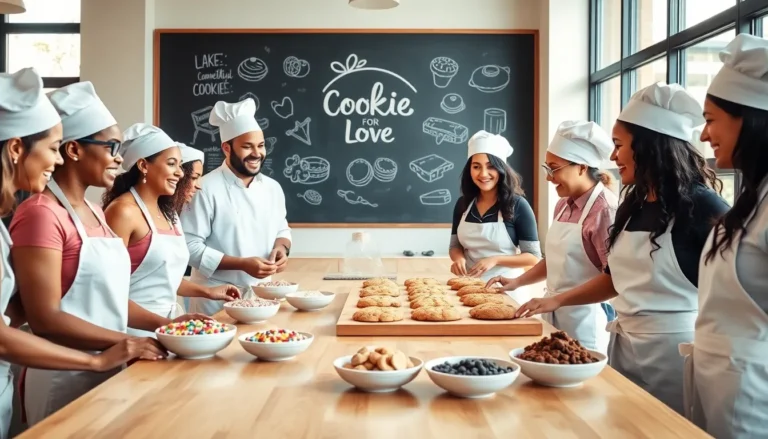Table of Contents
ToggleIn the bustling world of restaurants, a manager wears many hats—juggler, chef whisperer, and sometimes even a therapist for frazzled staff. Crafting the perfect resume is no small feat; it’s like trying to balance a tray of appetizers while dodging a stampede of hungry customers. With the right resume, a restaurant manager can showcase their skills and experience, making employers drool like patrons eyeing the dessert menu.
Overview Of Restaurant Manager Resumes
Restaurant manager resumes serve as essential tools for showcasing a candidate’s qualifications. A well-structured resume highlights relevant skills, experience, and achievements. Key components include restaurant management experience, staff leadership, and operational expertise.
Effective resumes should reflect industry-specific terms. For instance, terms such as inventory management, customer service, and profit margins resonate with hiring managers. Including specific metrics, like improving customer satisfaction scores by 20%, enhances credibility.
Formatting also plays a crucial role. Use clear headings, bullet points, and concise descriptions to increase readability. This approach ensures that essential information stands out to potential employers.
In addition to experience, emphasizing skills like communication, time management, and problem-solving attracts attention. Examples of successful team projects or operational improvements demonstrate the candidate’s impact. Showing adaptability in high-pressure environments can also make a significant impression.
Tailoring each resume to the specific restaurant or role remains important. Researching the restaurant’s culture and values helps align the resume with their needs. Moreover, highlighting relevant certifications or training strengthens a candidate’s overall profile.
By focusing on these elements, each resume can effectively communicate the applicant’s qualifications. Crafting a compelling narrative around their expertise enables them to stand out in a competitive job market. Candidates often find that aligning their resumes with the expectations of hiring managers increases interview opportunities.
Key Components Of A Restaurant Manager Resume
A well-structured restaurant manager resume includes several essential components. Each section serves a specific purpose in showcasing qualifications.
Contact Information
Contact information must appear prominently at the top. Include a full name, phone number, email address, and LinkedIn profile, if applicable. Ensure the email address sounds professional. By providing clear contact details, hiring managers can reach out without difficulty.
Professional Summary
A professional summary offers a brief overview of key achievements and strengths. This section should highlight relevant experience and unique skills. Tailoring the summary to the specific restaurant position increases its impact. Use strong action verbs and quantifiable results to grab attention.
Work Experience
Work experience forms the backbone of a restaurant manager resume. List positions in reverse chronological order, starting with the most recent job. Highlight responsibilities such as managing staff, improving processes, and achieving revenue targets. Quantifiable accomplishments lend credibility and illustrate capabilities effectively.
Education
Education details provide insight into the candidate’s academic background. Include degrees obtained, institutions attended, and graduation years. Additionally, relevant certifications such as food safety or management courses can enhance this section. Presenting education clearly aids in assessing qualifications.
Skills
The skills section must emphasize both hard and soft skills. Highlight experience with inventory management and customer service. Showcase leadership abilities, communication, and problem-solving skills within this area. Presenting a comprehensive skills list tailors the resume to match specific job requirements.
Tips For Writing An Effective Resume
An effective resume stands out by clearly communicating a candidate’s qualifications. It captures the attention of hiring managers, showcasing relevant skills and experiences.
Tailoring Your Resume
Tailoring a resume to specific job descriptions enhances its effectiveness. Candidates should analyze each posting for key skills and responsibilities, then integrate that language into their resumes. Highlighting relevant achievements demonstrates a strong fit for the role. Prioritize quantifiable results that relate to the employer’s needs. For instance, showcasing 15% increased sales through effective staff training can make a lasting impression.
Using Action Verbs
Using action verbs makes a resume dynamic and engaging. Each bullet point should start with a strong verb that conveys accomplishments. Words like “led,” “developed,” and “coordinated” add energy and clarity. Emphasizing achievements through these verbs can highlight initiative and contributions. Each action word should relate directly to the responsibilities of a restaurant manager, underscoring leadership and problem-solving abilities. Consistent use of action verbs throughout the resume reinforces the candidate’s active role in previous positions, making the document more compelling.
Restaurant Manager Resume Example
An effective restaurant manager resume includes specific components that highlight a candidate’s qualifications. Contact information typically occupies the top section. It makes sense to ensure that it is accurate and professional. The professional summary follows, where candidates summarize their key achievements relevant to the desired role. A compelling summary captures the attention of hiring managers.
Next, work experience presents significant details about past positions. Listing jobs in reverse chronological order provides a clear timeline of employment history. Quantifiable accomplishments such as increasing sales by 20% demonstrate real impact and leadership capabilities. Beneath work experience, education should detail degrees and any relevant certifications like ServSafe certification. Clarity in this section enhances understanding.
Skills encompass both hard and soft skills, reflecting the job requirements closely. Strong communication abilities stand out, as do expertise in inventory management and customer service. Tailoring resumes to job descriptions often leads to greater engagement from potential employers. Candidates should incorporate language from the job posting to resonate with hiring managers.
Precise formatting makes a resume easy to read. Using bullet points ensures key points stand out, while action verbs energize each achievement listed. Consistent action verbs throughout enhance the candidate’s active role across positions. All these elements combine to create a powerful resume that significantly boosts the chances of landing interviews.
Crafting a standout restaurant manager resume is crucial for those looking to make an impact in the competitive hospitality industry. By focusing on key elements like relevant experience and specific skills candidates can effectively showcase their qualifications. Attention to formatting and the use of action verbs not only enhances readability but also emphasizes accomplishments.
Tailoring the resume to fit specific job descriptions helps candidates resonate with hiring managers. With a well-structured and engaging resume in hand, aspiring restaurant managers can significantly increase their chances of securing interviews and advancing their careers. This strategic approach to resume writing is essential for making a lasting impression in the fast-paced world of restaurant management.







